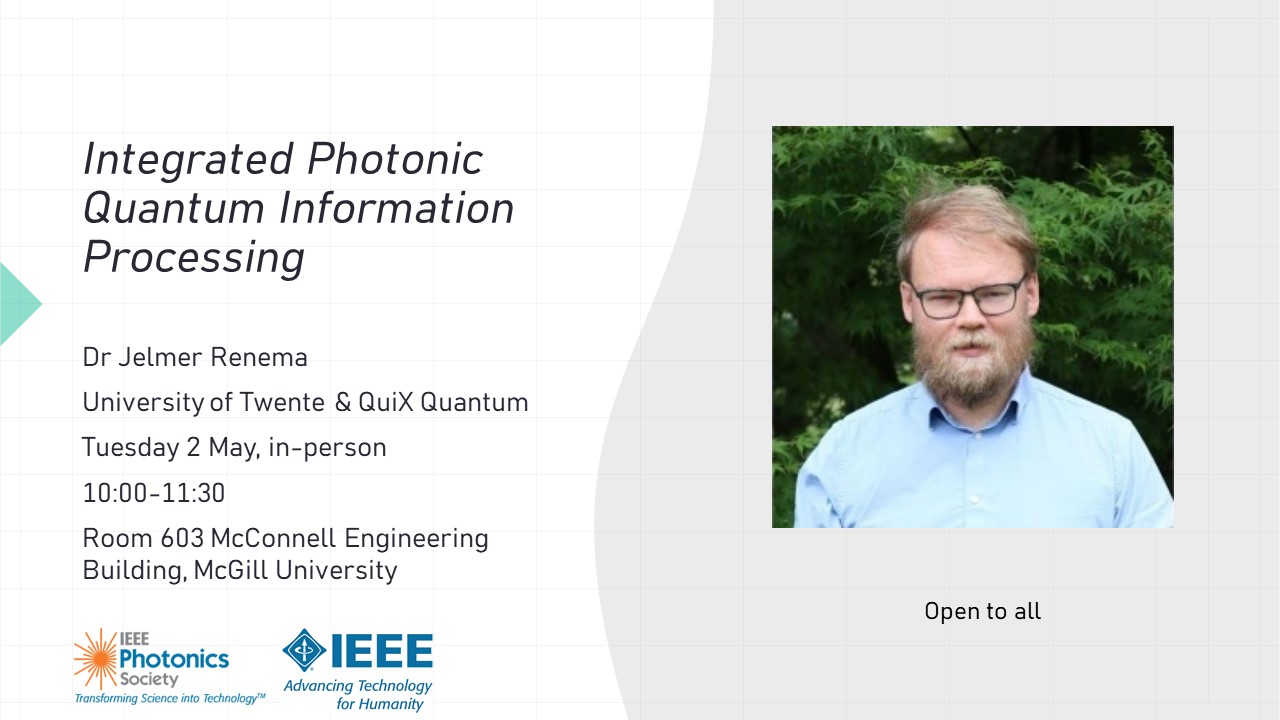Integrated Photonic Quantum Information Processing

In recent years, photonics has become one of the key contenders in the race to build large-scale quantum computers. The prominence of photonics as a quantum information technology is underscored by the fact that it is one of only a handful of technology platforms which has achieved a quantum advantage, i.e., a large-scale quantum system which outperforms a classical supercomputer at some well-defined computational task [1 2]. In this talk, I will highlight several aspects of the research that my team is doing in this field. I will focus on three aspects.
First, I will discuss some theoretical aspects of the recent quantum advantage demonstrations in photonics. A crucial matter in any quantum advantage demonstration is how noise affects the degree of quantum interference. There is an analogy here to Bell tests, with ever more sophisticated experiments leading to more sophisticated theoretical objections, and so on. The claims of [1] kicked off a lively debate regarding the way photon losses could be used to classically simulate the computational task for which a quantum advantage was claimed. I will discuss the prospects of simulating these optical systems using the theory that has been developed in the last years [3-5].
Second, I will discuss the complex engineering task of building the large-scale, tunable interferometers which are necessary to give these proof-of-principle systems a degree of programmability. In collaboration with a University of Twente spinout company QuiX Quantum B.V., we have recently demonstrated [6] the world’s largest quantum photonic processor, i.e. fully tunable multimode optical interferometer, using silicon nitride photonic waveguides.
Finally, I will focus on the quantum fundamentals work which is made possible by these technological advances. Large-scale photonic systems are an interesting novel testbed with which to explore the fundamental concepts and problems of quantum mechanics. Specifically, I will show how this platform can be used for quantum simulation of quantum thermodynamics, and I will show a novel entanglement witness for large-scale quantum states. This broad range of new science shows the promises and opportunities of this quantum technology platform.
[1] Zhong et al, Science 370, 6523 (2020).
[2] Zhong et al, arXiv:2106.15534.
[3] Renema et al, arXiv:1809.01953.
[4] Renema et al, arXiv:2012.14917.
[5] Renema et al, Phys. Rev. A 101, 063840 (2020).
[6] Taballione et al, arXiv: 2203.01801 (2022).
Date and Time
Location
Hosts
Registration
-
 Add Event to Calendar
Add Event to Calendar
- 3480 University Street
- Montreal, Quebec
- Canada H3A 0E9
- Building: McConnell Engineering building
- Room Number: MC603
- Contact Event Host
-
For extra information, please contact Prof. Odile Liboiron-Ladouceur odile.liboiron-ladouceur@
mcgill.ca and Dr. Kaveh Mojaver hassan.rahbardarmojaver@mcgill.ca
Speakers
Dr Jelmer Renema of (1) Adaptive Quantum Optics Group, University of Twente (2) QuiX Quantum B.V.
Integrated Photonic Quantum Information Processing
In recent years, photonics has become one of the key contenders in the race to build large-scale quantum computers. The prominence of photonics as a quantum information technology is underscored by the fact that it is one of only a handful of technology platforms which has achieved a quantum advantage, i.e., a large-scale quantum system which outperforms a classical supercomputer at some well-defined computational task [1 2]. In this talk, I will highlight several aspects of the research that my team is doing in this field. I will focus on three aspects.
First, I will discuss some theoretical aspects of the recent quantum advantage demonstrations in photonics. A crucial matter in any quantum advantage demonstration is how noise affects the degree of quantum interference. There is an analogy here to Bell tests, with ever more sophisticated experiments leading to more sophisticated theoretical objections, and so on. The claims of [1] kicked off a lively debate regarding the way photon losses could be used to classically simulate the computational task for which a quantum advantage was claimed. I will discuss the prospects of simulating these optical systems using the theory that has been developed in the last years [3-5].
Second, I will discuss the complex engineering task of building the large-scale, tunable interferometers which are necessary to give these proof-of-principle systems a degree of programmability. In collaboration with a University of Twente spinout company QuiX Quantum B.V., we have recently demonstrated [6] the world’s largest quantum photonic processor, i.e. fully tunable multimode optical interferometer, using silicon nitride photonic waveguides.
Finally, I will focus on the quantum fundamentals work which is made possible by these technological advances. Large-scale photonic systems are an interesting novel testbed with which to explore the fundamental concepts and problems of quantum mechanics. Specifically, I will show how this platform can be used for quantum simulation of quantum thermodynamics, and I will show a novel entanglement witness for large-scale quantum states. This broad range of new science shows the promises and opportunities of this quantum technology platform.
[1] Zhong et al, Science 370, 6523 (2020).
[2] Zhong et al, arXiv:2106.15534.
[3] Renema et al, arXiv:1809.01953.
[4] Renema et al, arXiv:2012.14917.
[5] Renema et al, Phys. Rev. A 101, 063840 (2020).
[6] Taballione et al, arXiv: 2203.01801 (2022).
Biography:
Dr. Jelmer Renema is an assistant professor in de department of Applied Nanophotonics at the university of Twente. He obtained his PhD cum laude in 2015 at the University of Leiden, in the group of Martin van Exter and Michiel de Dood. After that, he moved to Oxford, where he was postdoctoral researcher in the group of Ian Walmsley and a junior research fellow at Queens’ College. After this, he moved to Twente, starting his own research group in 2020. He is the cofounder of QuiX Quantum, the market leader in hardware for photonic quantum computing. He has co-authored 46 research papers.

